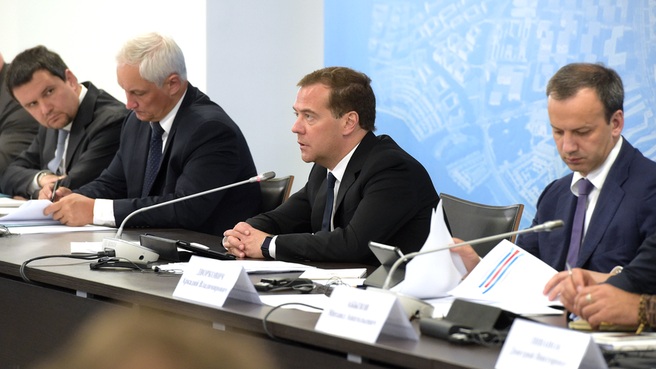Meeting of the Presidium of the Presidential Council for Economic Modernisation and Innovative Development.
Excerpts from Dmitry Medvedev’s opening remarks:
Our meeting is taking place at Innopolis, a new city that began being built just three years ago. What has been done during this time is impressive.
The first topic that we will consider is related to the implementation of the National Technological Initiative, and the second, to innovative development in IT. Both of these initiatives are important for ensuring that in the foreseeable future, Russia joins the group of leaders in new economic segments.
This is a long-term strategy for the country’s innovative development with a very significant, far-reaching planning horizon: 20 years. The directive was formulated by the President in his Message to the Federal Assembly. Today, it is a programme of joint actions by design and creative teams, investors, businesses, development institutions and ultimately the state. They should be oriented toward the introduction of advanced technology and the creation of new global markets.
In conjunction with the Academy of Sciences and the Strategic Initiatives Agency, the Government has accomplished a certain amount of work and has coordinated the main lines for the development of this initiative. Working groups, including scientists and business people, have formulated future global market models and have started working on roadmaps.
Given the complicated foreign policy situation, support for Russian IT developers and the development of our own technological solutions and platforms, i.e., infrastructure, is a matter not only of information but also national security. Our IT companies have fairly good competitive positions on global markets; they also have good technological solutions, many of which are in demand. So, we have a real opportunity not only to increase our share in domestic markets but also to boost the export of software in the next few years. This process should be encouraged and supported along a number of lines, and a business-friendly environment should be created.
This work is underway, including as part of the IT Development Strategy through 2020. It provides for a number of exemptions and preferences, including discounts on insurance contributions to state extrabudgetary funds and an increase in university admissions for IT specialties. Conditions for hiring foreign specialists in the sector, including mid-level managers, have also been improved. In some regions, profit taxes for IT companies have been cut to about 15 per cent instead of 20 per cent. So far there are only a few such regions.
The sector is also supported by development institutions, which have invested around $1 billion since 2008. However, it is impossible to do without state support here.
We should think about an array of additional measures to support IT projects, in particular as part of the National Export Centre. Perhaps we should grant a number of additional preferences for our companies, including in the provision of state and municipal services.












